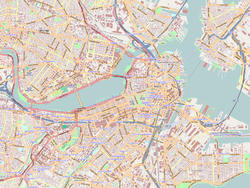Faneuil Hall Marketplace
|
Faneuil Hall
|
|

Faneuil Hall today, east side
|
|
| Location | Boston, Massachusetts |
|---|---|
| Coordinates | 42°21′36.0″N 71°03′22.5″W / 42.360000°N 71.056250°WCoordinates: 42°21′36.0″N 71°03′22.5″W / 42.360000°N 71.056250°W |
| Built | 1742 |
| Architect | John Smibert; Charles Bulfinch |
| Architectural style | Georgian |
| NRHP Reference # | 66000368 |
| Significant dates | |
| Added to NRHP | October 15, 1966 |
| Designated NHL | October 9, 1960 |
Faneuil Hall (/ˈfænjəl/ or /ˈfænəl/; previously /ˈfʌnəl/), located near the waterfront and today's Government Center, in Boston, Massachusetts, has been a marketplace and a meeting hall since 1743. It was the site of several speeches by Samuel Adams, James Otis, and others encouraging independence from Great Britain. Now it is part of Boston National Historical Park and a well-known stop on the Freedom Trail. It is sometimes referred to as "the Cradle of Liberty".
In 2008, Faneuil Hall was rated number 4 in America's 25 Most Visited Tourist Sites by Forbes Traveler.
After the project of erecting a public market house in Boston had been discussed for some years, merchant Peter Faneuil offered, at a public meeting in 1740, to build a suitable edifice at his own cost as a gift to the town. There was a strong opposition to market houses, and although a vote of thanks was passed unanimously, his offer was accepted by a majority of only seven. Funded in part by profits from slave trading, the building was begun in Dock Square in September of the same year. It was built by artist John Smibert in 1740–1742 in the style of an English country market, with an open ground floor serving as the market house, and an assembly room above. According to Sean Hennessey, a National Park Service spokesman, some of Boston's early slave auctions were located near Faneuil Hall.
...
Wikipedia

